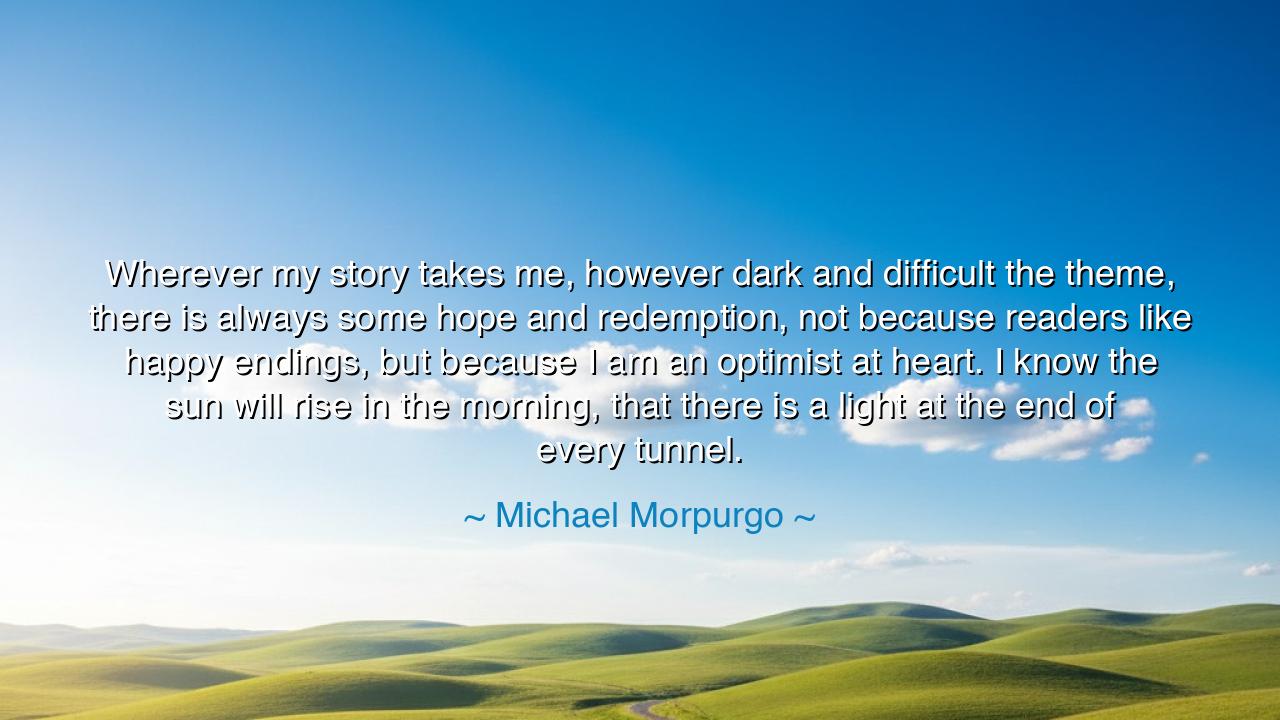
Wherever my story takes me, however dark and difficult the theme
Wherever my story takes me, however dark and difficult the theme, there is always some hope and redemption, not because readers like happy endings, but because I am an optimist at heart. I know the sun will rise in the morning, that there is a light at the end of every tunnel.






In the luminous and heartfelt words of Michael Morpurgo, the reflection — “Wherever my story takes me, however dark and difficult the theme, there is always some hope and redemption, not because readers like happy endings, but because I am an optimist at heart. I know the sun will rise in the morning, that there is a light at the end of every tunnel.” — shines as both a writer’s creed and a universal truth of the human spirit. Beneath its gentle tone lies a philosophy forged in compassion and perseverance: that even in the shadow of despair, there remains a seed of hope, waiting for light. Morpurgo, a teller of tales for the young and the weary alike, speaks not of naive joy, but of faith in renewal, of the quiet courage to believe that life, however cruel, bends always toward meaning.
The meaning of this quote reaches deep into the heart of both art and existence. Morpurgo reminds us that stories — like life — must face darkness, for to avoid it is to deny truth. Yet in every story he tells, however bleak the battlefield or broken the soul, there lingers the glimmer of redemption. Hope, in his vision, is not decoration but essence — it is the invisible thread that holds humanity together. He speaks as one who has seen sorrow and yet refuses surrender, as one who believes that the human heart, though fragile, is also indestructible when it clings to light. His optimism is not childish but heroic, for it is born not from ignorance of suffering, but from steadfastness in its face.
The origin of these words flows from Morpurgo’s own life and vocation. As a storyteller, he has often written of war, loss, and the cruelty of fate — tales like War Horse and Private Peaceful, where innocence walks beside horror. He does not turn from tragedy; instead, he transforms it, revealing the courage that survives amid ruin. His words reflect his conviction that storytelling is not only an art, but a healing act. To tell a story with hope is to remind both writer and reader that pain, though real, is never final. In his world, the sun will always rise, not because life promises happiness, but because hope is the heartbeat of survival.
This belief echoes through history, resonating with the endurance of countless souls who found light in the darkest hours. Consider Anne Frank, a young girl hidden in a small attic as war devoured the world. Surrounded by fear and uncertainty, she wrote in her diary, “In spite of everything, I still believe that people are really good at heart.” Her words, like Morpurgo’s, spring from the same well of inner faith — a refusal to let despair become the final truth. Even when her own story ended in tragedy, her words became an eternal testament to the endurance of hope, a light that has never dimmed. Such spirits prove that optimism, far from weakness, is the bravery of the soul that chooses to believe in goodness when all evidence says otherwise.
Morpurgo’s optimism, then, is not about denying pain, but about redeeming it. To him, every tunnel, however endless it seems, must have its end; every night must yield to dawn. This is not mere metaphor — it is a moral stance. For he knows that without hope, art becomes hollow, and without redemption, life itself loses meaning. His vision recalls the wisdom of the ancients, who taught that the human soul, like the phoenix, is reborn from its own ashes. Even when all seems lost, creation continues, the heart persists, and love — that quiet force of the universe — rises again, undefeated.
There is, too, a lesson for the living in Morpurgo’s words. He calls us to be seekers of light, even when surrounded by darkness. Each of us will walk through tunnels of grief, uncertainty, and trial. Yet he urges us to keep faith — not blind faith, but the active faith of the optimist, who builds, loves, and dreams even when the world trembles. His wisdom teaches that hope is not found by waiting for light, but by carrying it within oneself. In this way, we become both storyteller and story — shaping the ending with our own resilience, writing redemption into the very fabric of our days.
Let this, then, be the lesson we take from his words: that optimism is not the denial of suffering, but the declaration that suffering shall not have the final word. When life grows dark, remember that even the faintest light transforms the night. Like Morpurgo, dare to believe in the dawn. Seek the redemptive thread in every loss, and offer hope where others offer despair. For to do so is to become not merely a reader of stories, but a creator of them — one whose life, however tested, will shine as proof that there is indeed light at the end of every tunnel.
And so, my listener, remember the wisdom of Michael Morpurgo: “There is always some hope and redemption.” For the world is vast and filled with shadows, but hope is eternal. It is the sun that rises no matter how long the night, the melody that lingers when all else falls silent. Keep it alive within you — and no matter where your story leads, you will walk not in darkness, but in the radiant company of light.






AAdministratorAdministrator
Welcome, honored guests. Please leave a comment, we will respond soon